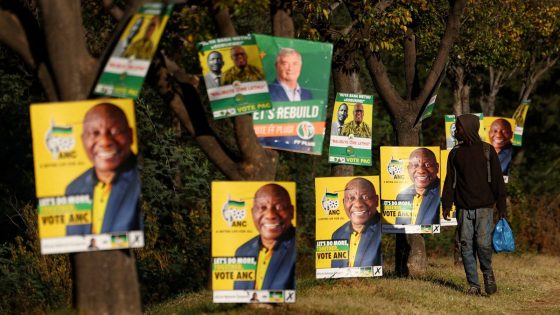South Africans head to the polls today in the most competitive election since the end of apartheid, with polls suggesting the ruling party could lose its majority.
The African National Congress (ANC) first swept to power under leader Nelson Mandela in the country’s first multi-racial election in 1994 and has won a majority in the six elections since.
But its vote share has steadily declined since the high of 70% in 2004 and the party could get less than 50% this year, according to polls.
Read more:
Everything you need to know about South Africa’s election
In this case, the ANC would remain the largest party, which means it could enter into a formal coalition with other parties or gain support on a vote-by-vote basis in exchange for concessions.
South Africa’s constitution does not lay out how a coalition could work, but if the ANC has the largest share of the vote, President Cyril Ramaphosa will likely remain in office.
Voter dissatisfaction over high rates of unemployment, frequent power blackouts and corruption in party ranks lies behind the ANC’s gradual fall from grace.
Although South Africans have on average become richer during the ANC’s three decades in power – average incomes have been on a downward trend since 2011.
Crime is also a huge problem, with one person murdered in South Africa every 20 minutes in the last three months of 2023 and more than 130 people raped every day over the same period.
More than 27 million South Africans are registered to vote at about 23,000 polling stations.
Voters will elect provincial assemblies in each of the country’s nine provinces, and a new national parliament that will then choose the next president.
Among opposition parties vying for power is the pro-business Democratic Alliance, which has formed an alliance with several smaller parties to try to broaden its appeal.
Read more:
South Africa president’s rallying call ahead of election
Former South Africa president banned from running
The Economic Freedom Fighters want to nationalise mines and seize land from white farmers to address disparities, while former president Jacob Zuma is backing a new party called uMkhonto we Sizwe (MK), named after the ANC’s former armed wing.
By law, South Africa’s electoral commission has seven days in which to announce full results, but normally releases partial results within hours of the polling stations closing.
Source Agencies


